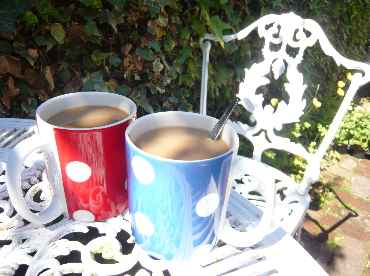
Well counselling often means different things to different people and that includes people who work within the counselling profession. However my view is that counselling is an opportunity to talk over problems at some considerable depth with a qualified and independent person. It is a safe and confidential space to explore past events, how they impact on the present and what the implications might be for the future.
Counselling can be an exploration of your thoughts and feelings enabling you to come to an understanding of the difficulties you face and so come to some sort of resolution and clearer perspective. Counselling is sometimes described as guided discovery; perhaps helping you to see the world the right way up.
It has been my experience that the difficulties people have to deal with do not always fit neatly under a particular heading. For instance, there might be more than one problem, or perhaps the problem is hard to identify or see clearly, leaving you with emotions that are difficult to understand. It is often at times like this that talking to someone independent, who will not judge or criticise will be helpful.
For some people it is the exploration of the problem that leads to a clearer understanding and then to the discovery of a solution.
For others there may no recognisable “problem” just an unfocused feeling that is the cause of unhappiness, anger frustration or some other negative response. If that is the case, then it might be helpful to give yourself the time to talk about your thoughts and feelings and where they are coming from. Expressing your thoughts and feelings to another person can lead to a clearer understanding of the things that may be at the root of the way you feel.

Counselling occurs when a counsellor sees a client in a private and confidential setting to explore a difficulty the client is having, distress they may be experiencing or perhaps their dissatisfaction with life or loss of a sense of direction and purpose. It is always at the request of the client and no one can properly be ‘sent’ for counselling.
By listening attentively and patiently the counsellor can begin to perceive the difficulties from the client’s point of view and can help them to see things more clearly, possibly from a slightly different angle. Counselling is a way of facilitating choice or change or reducing confusion. “I don’t know which way to turn… what to do… what’s the matter with me”, are frequent opening remarks.
In the counselling sessions the client is enabled to explore various aspects of their life and feelings concerning those aspects, talking about them freely and openly in a way that is rarely possible with friends or family, to a person who neither judges nor offers advice. Bottled-up feelings such as anger, anxiety, grief and embarrassment can become very intense. An opportunity to express them, thus making them easier to understand. The counsellor will encourage the expression of feelings and as a result of their training will be able to accept the client’s feelings without becoming burdened by them.
The client can gain self-respect and a sense of being of value by having their feelings acknowledged, and thereby being accepted and respected as a person in their own right. The relationship between the client and the counsellor is an essential part of the process. Therefore as trust is built up, the counsellor will encourage the clients to look at aspects of their lives; their relationships and themselves, which they may not have thought of or felt able to face before. There may be some exploration of early relationships to discover how they came to react to certain people or situations in certain ways that contribute to their difficulties, followed by consideration of ways in which they might change. The counsellor may set out the options open to clients and help them to follow whichever one they choose. The counsellor may help the client to examine in detail the situations or behaviour which are proving troublesome and to find a small but crucial point where it would be possible to initiate some change as a start. Whatever approach the counsellor uses, and these are only examples, client autonomy is the ultimate aim: for the client to make their own choices, to make their own decisions and put them into action.
(BACP information leaflet July 2008)
This little story comes from one of those e-mails that friends send from time to time. I must admit that I don’t usually find them all that helpful, but this one is quite thought provoking, it seems to be about getting things in perspective and does seem to have some relevance to counselling and psychotherapy.
I wonder what you think.

When things in your life seem almost too much to handle, when 24 hours in a day are not enough, remember the mayonnaise jar and the 2 cups of coffee.
A professor stood before his philosophy class and had some items in front of him. When the class began, he wordlessly picked up a very large and empty mayonnaise jar and proceeded to fill it with golf balls. He then asked the students if the jar was full. They agreed that it was. The professor then picked up a box of pebbles and poured them into the jar He shook the jar lightly. The pebbles rolled into the open areas between the golf balls. He then asked the students again if the jar was full. They agreed it was.
The professor next picked up a box of sand and poured it into the jar. Of course, the sand filled up everything else. He asked once more if the jar was full. The students responded with a unanimous 'yes.'
The professor then produced two cups of coffee from under the table and poured the entire contents into the jar effectively filling the empty space between the grains of sand. The students laughed.
'Now,' said the professor as the laughter subsided, 'I want you to recognize that this jar represents your life. The golf balls are the important things - your family, your children, your health, your friends and your favourite passions - and if everything else was lost and only they remained, your life would still be full.
The pebbles are the other things that matter like your job, your house and your car. The sand is everything else - the small stuff. 'If you put the sand into the jar first,' he continued, 'There is no room for the pebbles or the golf balls. The same goes for life. If you spend all your time and energy on the small stuff you will never have room for the things that are important to you. Pay attention to the things that are critical to your happiness. Spend time with the people you love. Take time to get medical checkups. Take your spouse out to dinner. Play another 18. There will always be time to clean the house and fix the disposal. Take care of the golf balls first - the things that really matter. Set your priorities. The rest is just sand.'
One of the students raised her hand and inquired what the coffee represented. The professor smiled and said, 'I'm glad you asked.'
"The coffee just shows you that no matter how full your life may seem, there's always room for a couple of cups of coffee with a friend."
_________________________________________________
And now something a little lighter.
I am not too sure about the counselling in the following link, and I hope that I don't work in quite the way that is shown, however every time I see this it always makes me smile, so I thought I would share it.
Please - not to be taken too seriously!
Click for Bob Newhart and stop it therapy on youtube.
1 Albert Cottage
Moor Lane
Sarratt
